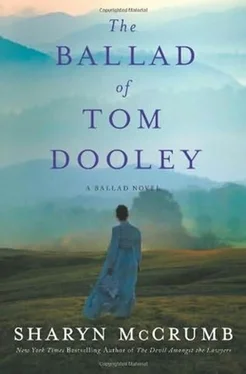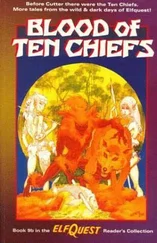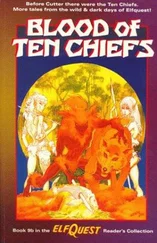“Nor will you, Captain. Rest assured. You and I will die in our beds like gentlemen, and no one will be singing broadside ballads about us after we’re gone.”
“Well, if they do write any songs about Tom Dula, I suppose he has earned them. He died game, as he would have phrased it. When they pulled the cart up underneath the gallows, we all got out, leaving him there alone with his coffin. This must have been Sheriff Wasson’s first hanging, for he had erected a shoddy excuse for a gallows that couldn’t have taken an hour to put together. Two upright posts of cheap pine, with a crosspiece set across the top. I was afraid the thing would not hold his weight, and that he would topple to the ground still alive. It sickened me to think of it.”
“I daresay it might have broken under my weight,” I said, patting my substantial girth. There had been lean times during the War, but I had been making up for it since, and it showed. “But I take your point about Sheriff Wasson. There are problems with North Carolina’s one-term sheriff law, and you have hit upon a major one. It is the county sheriff who must hang the convicted prisoners, but in a four-year term, a sheriff is not likely to perform enough executions to become proficient at it. We ought to follow England’s example and have one well-trained hangman to service the whole state. It would be a kindness to all concerned not to have our executions turned into botched exercises in torture through the incompetence of the hangman.”
“Well, Governor, if you ever get elected to office again, perhaps you could suggest such a plan. And you might consider limiting the condemned man’s last words, while you’re about it.”
“Oh, I don’t know. I’m famous for my speech making. If I had a rope around my neck, I believe I could talk for a week.”
“Yes, perhaps it was the fear of death that made him talk at such length. Or perhaps he thought that if he could stall long enough, a rider would come tearing up the road, waving the Governor’s pardon-but of course, no such thing happened. He talked about his childhood in Happy Valley, and he talked about his experiences in the War. He even touched on politics in his harangue. Apparently, he is not fond of our new governor Holden. Called him a secessionist.”
“Yes, they weren’t fond of the Confederacy in Wilkes County. That’s why I moved the trial to Statesville. As the former Confederate Governor, I thought I could win with a sympathetic jury in a county where I was personally popular-or at least not vilified as a secessionist.”
“We agreed with you, though, Armfield and I. As we had no evidence to refute the charges, it did seem the best course.”
“Did Dula get around to talking of the murder in his oration?”
“He did. He protested his innocence loud and long, but he also commented on the physical evidence presented in the trial. Something about the roads leading to the Bates’ place. Oh, and the map that the prosecution put in to evidence. He cursed Colonel Isbell, who drew it, and he insisted that there were errors in the map. And he accused some of the state’s witnesses of swearing falsely against him.”
“Did he mention the servant girl, Pauline Foster? I’d agree with him there. What was it the newspaper called her? A monster of depravity?”
“Well, a woman who has recently given birth to a black child, although her husband is as white as she is… one can hardly call her faithful.”
“He may only be a common-law husband at that. Some poor old wretch from up the mountain who thinks a simpering young woman is a prize. I wonder what she told him about the child. I’d give worlds to know who its father is myself.”
“I doubt she would ever say, if indeed she knows.”
“The Foster women have an uncommon gift among the fair sex: they can hold their tongues. In the two years she has languished in jail, Ann Melton has not said one word in her defense or to accuse anyone else of the crime. She is a sphinx. And it has served her well. She will go free. I have no doubt of it.”
“Tom Dula talked enough at the end, but he said nothing at all about her. Anyhow, I don’t think his preaching made him any converts. Nobody cared about the fine points of evidence by then. Most of the crowd believed him to be guilty, and they were ready to see him hang. At last, he ran out of words, and, giving his sister a tender farewell, he indicated to the sheriff that he was ready to proceed. It was half past two o’clock by then. A deputy threw the rope over the crosspiece of the gallows and tied it in place. Then at a signal from the sheriff, another deputy took hold of the horse’s bridle, and they led it away, so that the cart slipped out from under the prisoner’s feet.”
I shook my head. “Wasson made a hash of it, didn’t he?”
“Oh, yes. It was torture to watch. The drop was less than three feet-not enough to break the prisoner’s neck. So the end was not quick-or kind.”
“We don’t know how to hang people in this country, I tell you. In England, now…”
But Allison wasn’t listening. He was staring at the marble floor, but seeing the hanging happen again. “He did not struggle. It must have been agony for him to hang there while the rope slowly throttled him. I have wondered how long he was conscious during the ordeal, and if he could hear the roar of the crowd as he strangled. I hope not. I hope he passed out quickly. When I could no longer bear the sight of it, I closed my eyes and whispered a prayer for the repose of his soul. After thirteen minutes, Dr. Campbell pronounced him dead, but Wasson left the body suspended there on the gallows for ten minutes more, to make sure. And all the while, the rabble was cheering as if it were a horse race.”
I shuddered, trying not to envisage it myself. “He is out of it now, poor devil. I suppose the sister and her husband took him back to Wilkes County for burial?”
“Yes. They were going to bury him a mile or two from his mother’s place, on the farm of a prosperous cousin, I think. So he is at rest a good seven miles from the place where Laura Foster lies buried now.”
“Oh, he won’t care about that, Captain. He always said that she meant nothing to him, and I believe him. This was always about Ann. I wonder where there’ll bury her. At a crossroads with a stake through her heart, if they are wise.”
“She is but twenty-four, though. She may live to see the new century come in.”
“No, Captain. Like Jezebel and Cleopatra, I think she will die young. And, like you, I see no hope of heaven for her, but I can well imagine their reunion in the hereafter-two troubled souls reuniting after death… Ann Melton and Tom Dula, together in the mists of that ridge next to Reedy Branch.”
Captain Allison smiled. “You have grown fanciful, Governor Vance. If you knew Wilkes County as I do, you would never be able to imagine restless spirits in that quiet earth.”
***
I would have been content to let it rest there, with Captain Allison’s comforting epitaph ending the matter in a bucolic haze, but life is seldom so accommodating as that. Much as I might have wanted to forget the whole Wilkes County incident, and return to more profitable endeavors elsewhere, there was still the matter of the second defendant, Mrs. Ann Melton. Her trial was set for the court’s fall term, and, while it would be a brief and perfunctory appearance, thanks to Tom Dula’s confession, I was still obliged to attend and to confer with the prisoner about the state of her case. I took the train to Statesville to meet with her.
All was peaceful at the depot when I arrived, with flies buzzing in the late summer sunshine. I found it hard to imagine that only a few months earlier thousands of spectators had thronged in the adjacent field to watch a man die. I shuddered to imagine it, and made my way as quickly as I could to the county jail to see my remaining client.
Читать дальше












